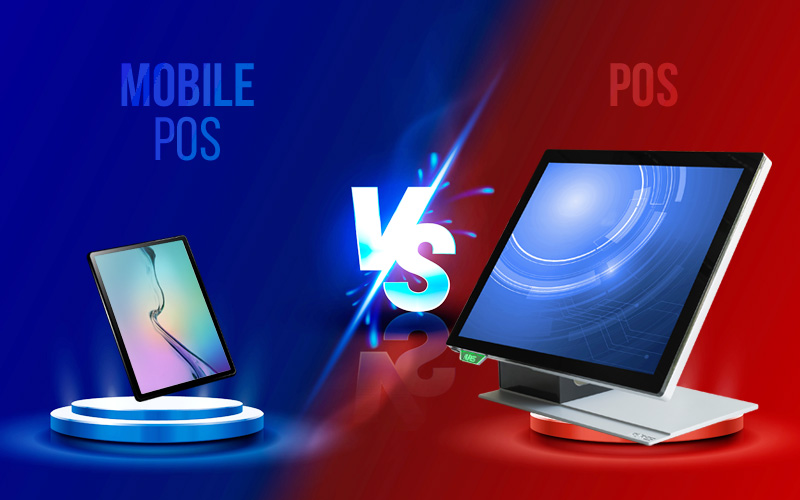Point-of-sale terminals (POS systems) and tablets (Mobile POS or mPOS) are, along with interactive kiosks, different options available to professionals* in the retail and commercial sectors in the broadest sense; they can help them better manage their sales and payments processes (*Hotels, restaurants and food services included). Each of these solutions can offer advantages, but making the right choice is not easy and usually depends on the specific needs of the company or business concerned.
Here are a few arguments that we hope will help you precise your vision and your needs in this area:
- Robustness and durability: POS terminals and systems are generally designed to be and remain robust and durable; suitable for intensive use in demanding commercial environments, they are stable and made of stronger materials and subsystems than tablets to withstand the test of time. Mobile POS devices, even the most rugged ones, will often be more vulnerable to humidity, dust, heat, knocks and drops.
Similarly, tablet batteries have a shorter lifespan than those of POS systems: they need to be re-charged and replaced regularly.
- Extended connectivity: POS terminals often offer increased connectivity and a large number of I/O (input/output) ports, for optimised connection with the many external POS peripherals; these are essential tools and accessories for efficient point-of-sale management (ticket printers, barcode and RFID scanners, cash drawers, etc.). The lack or absence of ports such as USB, USB Retail, LAN and COM….. on tablets makes certain in-store operations difficult or even impossible.
- Optimised performance: POS systems are generally equipped with more powerful subsystems (motherboard and processors, for example) than tablets, enabling POS applications to run more quickly and smoothly, particularly in high-volume retail environments. Thanks to more powerful processors, multitasking and switching from one application to another with a single click will often be easier on a POS system than on a tablet.
- Storage capacity: Mobile POS systems generally offer less storage space than regular point-of-sale terminals, a disadvantage when the hardware used has to store large databases, for example.
- Operating systems, software & updates: POS terminals run on operating systems and specialised platforms and software designed specifically for commercial transactions. Tablets, on the other hand, generally use consumer operating systems (iOS, Android) and are therefore less suited to the wide range of POS operations. What’s more, as tablets age, they may become less compatible with the latest developments required by the various software packages in use, making certain upgrades complicated or virtually impossible.
- Internet connection: some Mobile POS functionalities, such as cloud-based applications (SAAS), depend on a stable Internet (via WIFI); this is more difficult to obtain with mobile terminals, which usually require additional in-store WIFI spots in the shop to work properly; this problem can be avoided by choosing fixed terminals.
If you want a reliable and simple Internet connection, you will prefer the classical POS option.
- Hardware integration: some POS terminals are supplied with integrated peripherals (magnetic card readers, for example), which simplifies the integration of a number of in-store transactions.
- Security: POS systems are often equipped with advanced security features to protect sensitive financial transaction and customer data; they therefore meet higher security standards for the management of sensitive information exchanged and/or stored. Because of their mobility, tablets host a large number of applications (and ‘bugs’) which carry the risk of potential breaches in the confidentiality and security of certain sensitive data.
- Screen size: the small sizes of tablets’ screens mean that ergonomics and visual comfort are often limited. Furthermore, some management and POS software is primarily designed for larger screens (10″ vs. 15″).
- Programmed obsolescence: new tablets’ versions are frequently proposed by their manufacturers – which can lead to a relatively rapid obsolescence of certain Mobile POS devices and create problems with the homogeneity of the installed systems. This is a concern, particularly in the case of very expensive consumer tablets (such as the Ipad, for example).
- Specialised maintenance and technical support: most of the time, point-of-sale terminals are supplied with contractual, specialised, and customised technical support, which is essential for resolving any problems quickly. This is not the case for most tablets.
——————–
In conclusion, we consider that POS terminals will often be more reliable, more durable and more efficient than a solution deployed on table; nevertheless, Mobile POS can offer specific advantages: their lightness, mobility and flexibility at the point of sale will need to be taken into account in some specific retail environments, often as a complement to a more traditional POS infrastructure.


